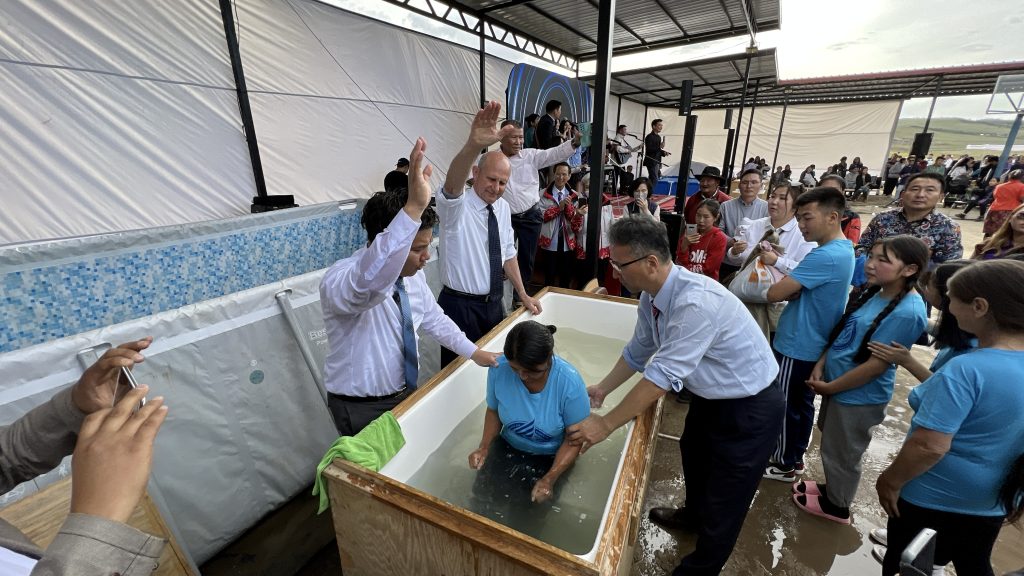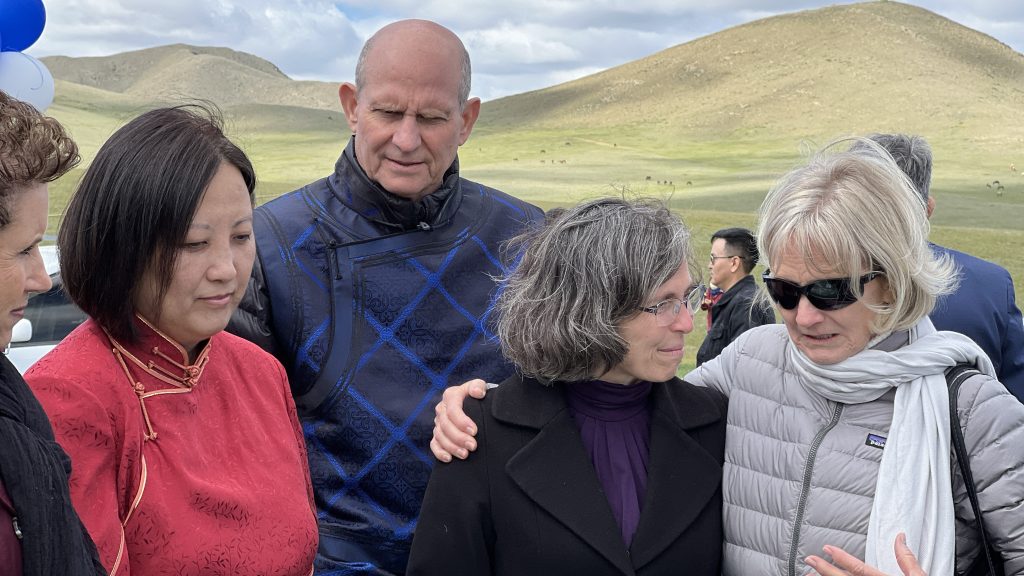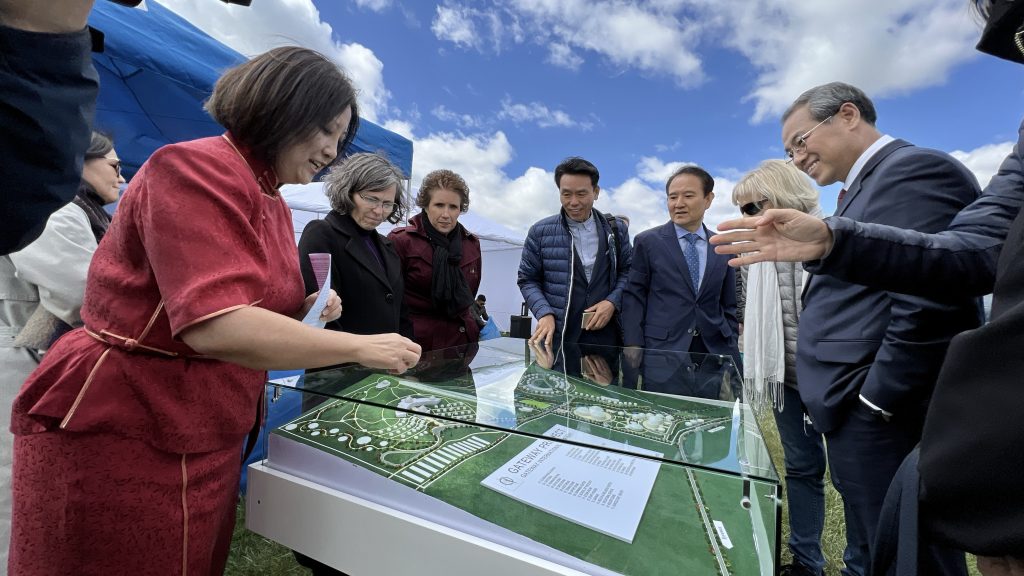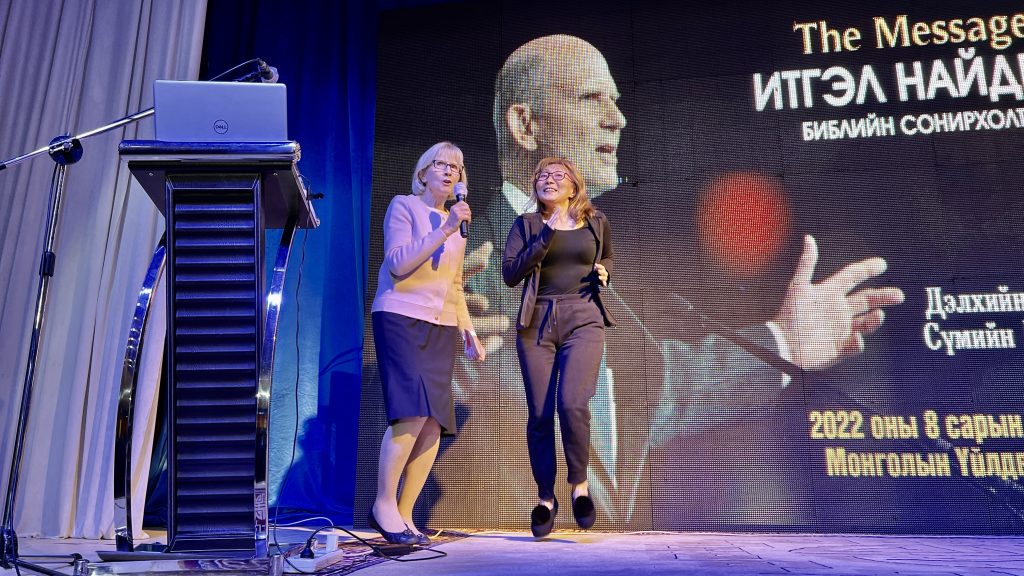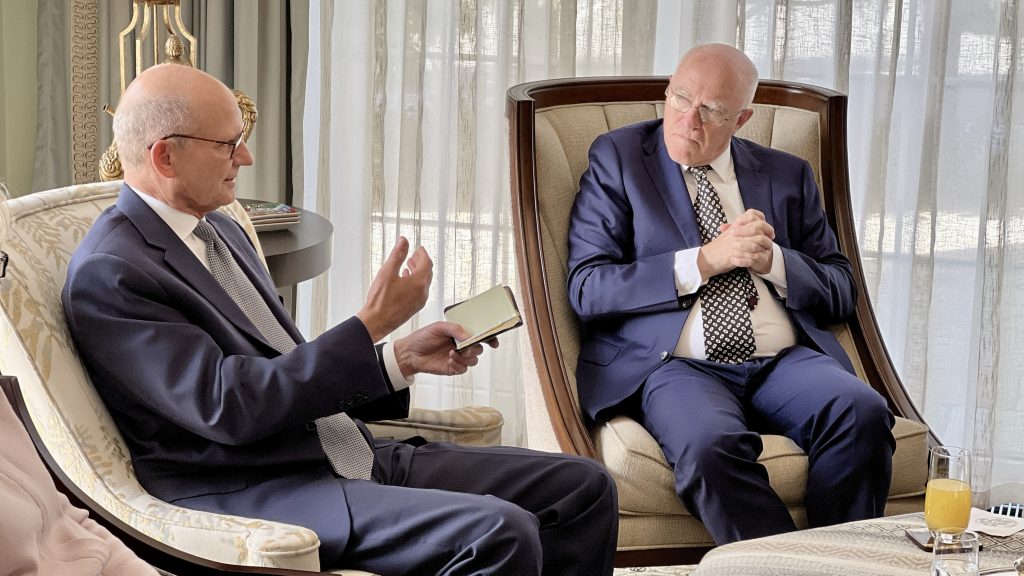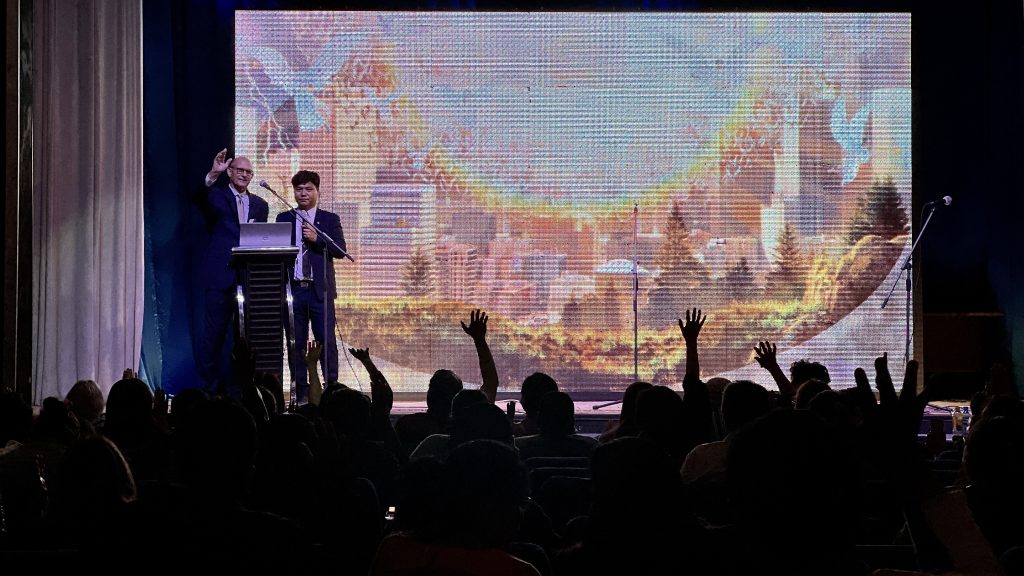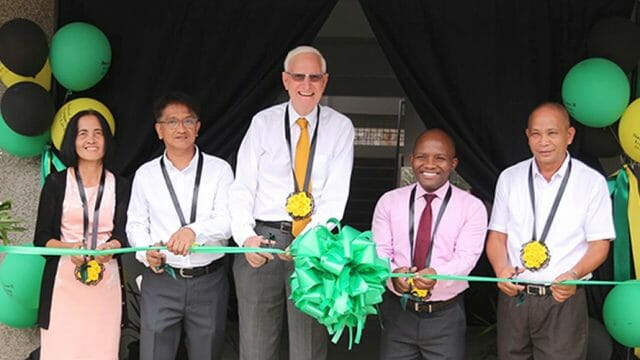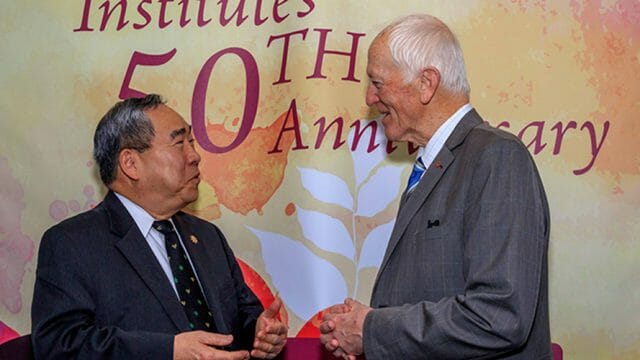Celebrations with Ted Wilson boost morale in a remote country.
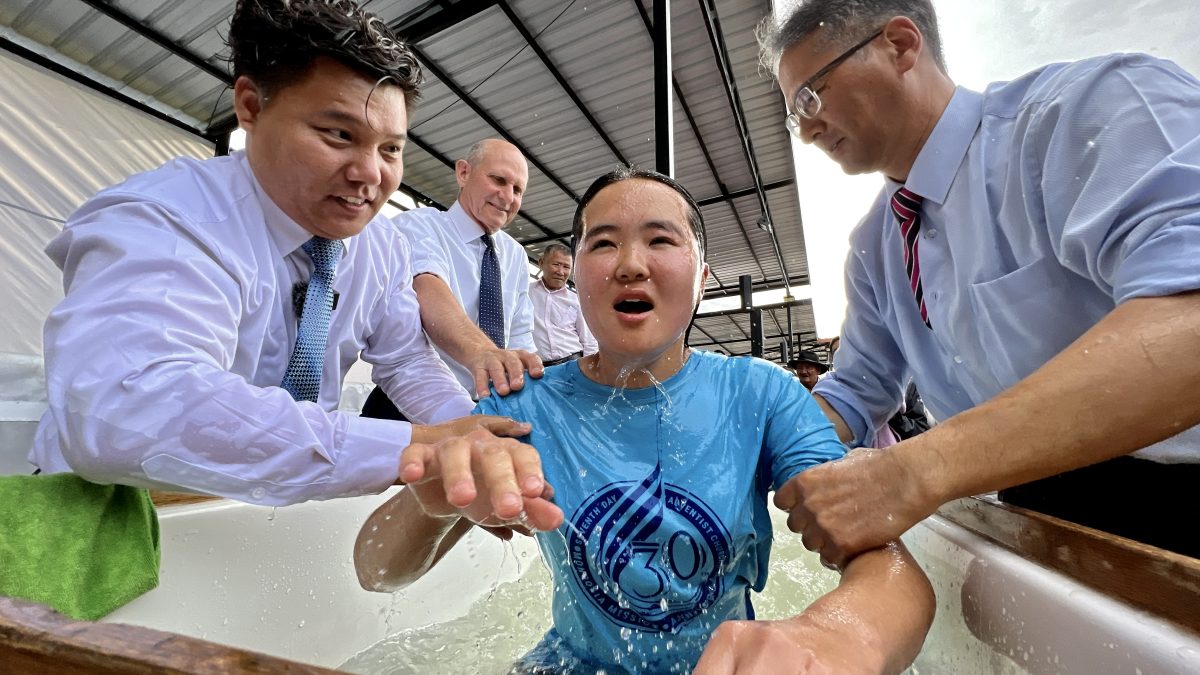
Tears filled Joanne Kim’s eyes as she watched the first three Mongolians get baptized and join the fledgling Seventh-day Adventist Church in Mongolia in 1993.
Her eyes again filled with tears as she watched 155 Mongolians get baptized on August 27 on the 30th anniversary of the first church that she helped plant in Mongolia.
“As one of the pioneer missionaries who helped plant the Adventist Church in Mongolia, I remember the first baptism and many of the following ones, and I’m always tearful and joyful when we hold a baptism,” said Kim, an American who attended the baptismal ceremony at a youth camp on the outskirts of Mongolia’s capital, Ulaanbaatar.
The baptisms capped August 20-27 evangelistic meetings at 21 sites across the remote country as General Conference president Ted N. C. Wilson, Kim, and hundreds of other church members celebrated the 30th anniversary of the first Adventist church plant in September 1992 with a whirlwind of activities, including visits with Mongolia’s deputy prime minister and the U.S. ambassador to Mongolia.
The anniversary celebrations also offered a welcome boost in morale for a church that has struggled amid COVID-19 restrictions and a decline in crucial financial support from abroad, church leaders said.
Wilson, making the second visit by a General Conference president to Mongolia since Robert S. Folkenberg conducted the first three baptisms in October 1993, expressed joy at seeing God’s power first-hand in Mongolia.
“What a privilege it has been to get acquainted with our people and God’s work in Mongolia and to see the increase from no members in 1992 to about 3,200 members and several institutions by 2022,” said Wilson, who led one of the 21 evangelistic meetings with his wife, Nancy.
“Despite the 10/40 Window setting with a very small minority of Christians in the country, God is blessing the strong work of Seventh-day Adventists to grow and proclaim the three angels’ messages,” he said by e-mail.
Tough Beginnings
Adventists first brought the gospel to Mongolia in the 1920s, but there was no Adventist presence in the country in the post-communist days of the early 1990s, when Kim joined fellow American missionaries Cathie (Jolly) Hartman and her husband, Brad, who had arrived earlier.
“Life was much harder back in the early 1990s,” said Kim, now education director of the Adventist Church’s Mongolia Mission.
Amid financial and other difficulties, the efforts by Kim, the Jollys, and others bore fruit with the planting of a first church with the three baptisms in 1993. Kim said that the early church, although small in size, was large in love for God and self-sacrifice. She and her husband, Jon, a dentist, hope that the 2022 anniversary celebrations help rekindle a similar spirit in the post-COVID era.
“I pray for that spirit of unity and self-sacrifice to be renewed in today’s much larger church organization,” she said in an interview. “Jon and I want to bring back the spirit of the early church from the 1990s.”
She and her husband have received approval from the Mongolia Mission to plant a new church.
Boost in Morale
The anniversary celebrations have bolstered morale, said Mongolia Mission president SukHee Han.
With the 155 baptisms, the Mongolian church is on target to baptize 300 people in 2022, a sharp increase from the average of 30 baptisms per year during the COVID-19 pandemic, he said. Fifty-nine people were baptized when the first COVID restrictions were lifted in March 2022.
“Although worship services were held online, on YouTube, and through Zoom meetings, it was difficult for pastors and church members to meet during the pandemic,” he said in a reply to written questions. “When COVID restrictions were gradually eased in March of this year, church doors reopened, but church members who had not met face-to-face for almost three years desperately needed an opportunity to gather and fellowship together.”
The presence of the General Conference president provided just the boost that church members needed, said Yo Han Kim, president of the Northern Asia-Pacific Division, whose territory includes Mongolia, and who is himself a former Mongolia Mission president.
“Elder Ted Wilson’s visit gave the Mongolia Mission and the Northern Asia-Pacific Division great comfort, encouragement, and strength,” he said by e-mail. “After being unable to gather in church to worship for such a long time, the members and leaders were having a very difficult time. The General Conference president participated directly in the evangelistic meetings, and the Mongolia Mission gained vitality through them.”
Further boosting morale, church leaders broke ground on a new school of theology funded by a much-appreciated 400 million won (US$300,000) donation from the Korean Union Conference, the Adventist Church’s Sijo Press, and Korean church members, Han said. The school will be located on the sprawling campus of Gateway, which also will include Gateway International Academy, a wellness center, a vocational school, an agriculture center, and a resort and recreational center whose income will help support the educational endeavors on the campus.
High-Profile Meetings
The Gateway project was central in talks between Wilson and Mongolian Deputy Prime Minister Amarsaikhan Sainbuyan at the parliamentary building in Ulaanbaatar on August 25.
“Deputy Prime Minister Amarsaikhan Sainbuyan was so gracious and has a deep concern for the health needs of the people of Mongolia,” Wilson said. “It was our privilege to share the Gateway project with him and receive his support.”
Joanne Kim, who attended the meeting and is coordinator of the Gateway project, described the encounter as a significant step in the church’s relations with the authorities.
“I feel that God used Elder Wilson’s visit to initiate contacts that would have otherwise been difficult to make,” she said. “The meeting with the deputy prime minister came about in a miraculous way, and he was so receptive. We’re praying that our follow-up with this powerful leader will continue to strengthen our relationship.”
In another high-profile visit, Wilson met U.S. Ambassador to Mongolia Michael S. Klecheski to discuss, among other things, religious liberty and freedom of conscience.
“Freedom of worship is vital for a healthy democracy,” Klecheski tweeted after the August 22 meeting. “I enjoyed talking with President of the General Conference of the Seventh Day Adventist Church Ted Wilson and regional and local Adventist leaders about important issues for faith communities in Mongolia.”
TMI and the Future
Mongolia’s evangelistic meetings, while organized to celebrate the 30th anniversary, are part of a world church initiative called Total Member Involvement (TMI) evangelism in which every church member shares Jesus with someone else. Mongolian church members reached out to friends and neighbors for Bible studies before the meetings. TMI evangelism started with evangelistic meetings led by Wilson in the metropolitan New York City area in 2013 and has spread across the globe to result in tens of thousands of baptisms in the Philippines, Zimbabwe, Zambia, Rwanda, Romania, Japan, and many other countries. TMI evangelism in Rwanda culminated in a record 110,000 baptisms in 2016.
“Christianity is not well established in Mongolia but is growing, praise be to God!” Wilson said. “These meetings are a fine example of Total Member Involvement where everyone is involved in helping the public and personal evangelism activities to grow.”
Among the other church leaders who attended the anniversary celebrations were Williams Costa, General Conference communication director, and his wife, Sonete; Elbert Kuhn, General Conference associate secretary for volunteer programs, and his wife, Cleidi, who served as missionaries in Mongolia for nine years; and Henry Stober, an Adventist videographer living in Sweden who chronicled the events. Also present were the executive officers of the Northern Asia-Pacific Division and a delegation from the Korean Union Conference led by union president Soon Gi Kang.
Hiroshi Yamaji, executive secretary of the Northern Asia-Pacific Division, said he was encouraged by the many children and young people whom he saw at the meetings.
“They are the church now, and they will be the leaders of the Mongolia Mission in the near future,” he said by e-mail. “I saw great possibilities and hope in Mongolia.”


